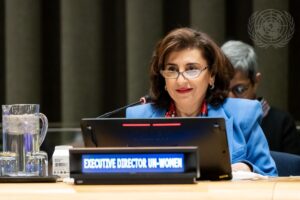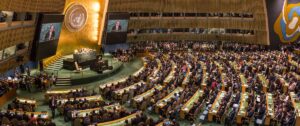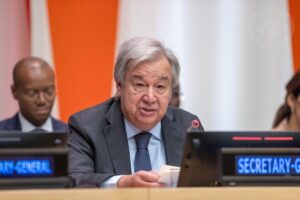Synthesis of Major Insights & Recommendations
On 30 September 2021, the Permanent Mission of Qatar to the United Nations, the West Asia North Africa Institute, the Islamic Cooperation Youth Forum, Peace Child International, and the Stimson Center held a virtual forum to discuss the role of youth in West Asia and North Africa (WANA) in catalyzing action on a range of regional and global challenges. Steps toward advancing the sustainable development goals (SDGs) are not progressing at a pace that is needed to mobilize and secure substantial positive change. Therefore, it is imperative that young people in the WANA region are i.) empowered to set ambitious and sustainable goals; and ii.) given the long-term resources, tools, and moral encouragement to achieve such goals. The themes and proposed ideas discussed during the ninety-minute webinar aim, in part, to promote and complement the ambitious objectives set forth for present and future generations in the UN Secretary-General’s Our Common Agenda, introduced earlier this month to take forward the promise of the UN75 Declaration. Though the WANA youth have been disproportionately impacted by the COVID-19 pandemic, they maintain the drive and resilience that is needed to respond with passion and creative ingenuity – not only to the pandemic, but to violent conflicts, refugee crises, unemployment, and climate change. In sum, the panelists called upon global and regional institutions, and the international community more broadly speaking, to invest in the general welfare of youth within the WANA.
Though the WANA youth have been disproportionately impacted by the COVID-19 pandemic, they maintain the drive and resilience that is needed to respond with passion and creative ingenuity – not only to the pandemic, but to violent conflicts, refugee crises, unemployment, and climate change. In sum, the panelists called upon global and regional institutions, and the international community more broadly speaking, to invest in the general welfare of youth within the WANA region and worldwide too. This should involve socio-economic programs that foster youth development in the areas of education, health care services, job security, and occupational and technical training. Furthermore, by investing in young people today, we are securing a more stable and innovative future for all generations.
The keynote speakers for the event included H.E. Salah bin Ghanem Al Ali, Minister of Culture and Sports of the State of Qatar, Jayathma Wickramanayake, UN Secretary-General’s Envoy on Youth, and H.E. Taha Ayhan, President, Islamic Cooperation Youth Forum. Following their keynote remarks, a moderated dialogue was convened with Dana Khalid Al-Anzi, President of Y17 Society and youth activist, Saad Abid, President of “Bahri” and climate activist, Enes Efendioğlu, Founder of Civil Life Association, Reem Al Haddadin, Researcher, Sustainable Development Pillar, West Asia North Africa Institute, and Maha Yassin, Junior Researcher, Planetary Security Initiative, Clingendael Institute. Ravi Theja Muthu, Founder of P4G Labs and member Peace Child International, moderated the dialogue. Banou Arjomand, Research Assistant, Global Governance, Justice & Security, Stimson Center, summed up the dialogue through closing remarks and offered a vote of thanks to the panelists, event co-sponsors, and members of the global audience. Joseph Terterian, an Armenian Tenor originally from Damascus, Syria, also shared his original music at the start and conclusion of the program.
You can watch the event recording here.
Co-sponsors: Stimson Center, Permanent Mission of Qatar to the United Nations, the West Asia North Africa Institute (WANA), the Islamic Cooperation Youth Forum, and Peace Child International.

Key Quotes from the Keynote Speakers
“The world has witnessed in the last few years major challenges that herald a new era in human civilization, highlighting an urgent need for a creative force able to take on those challenges. This force is the youth of the world, who will lead based on principles and values that unite all humanity.” – H.E. Salah bin Ghanem Al Ali
“Our common mission is a world in which: the human rights of every young person are realized, a world that ensures every young person is empowered to achieve their full potential, and a world that recognizes young people’s agency, resilience, and their positive contribution as agents of change” – Jayathma Wickramanayake
“Social distancing regulations have required an alteration to our normal way of living. This is the case not only in terms of adopting new physical conditions, but we are also facing complex problems in the terms of mental health and Covid ethics and post-Covid ethics.” – Taha Ayhan
“Our youth need to be empowered to participate in public life and in support of sustainable development, and they need to be part of the decision-making process to be productive and to meet their full potential.” – H.E. Salah bin Ghanem Al Ali
“Weaving them [the youth] into international decision-making is important not just because they are global beneficiaries, but as key actors who are playing a critical role in contributing to a more sustainable future” – Jayathma Wickramanayake
“They [international community] should see the youth as a treasure and inherent value to society, rather than being treated as a potential risk or simply as an economic asset.” – Taha Ayhan
Major Points Voiced by Participants
- “Act Local, Think Global!”
- More than half of the world’s population is below the age of 30 – the highest percentage in recent history – and many of them live in the WANA region. This represents the greatest opportunity to achieve and accelerate sustainable development.
- Young people have shown their leadership, innovation, courage, and resilience during the pandemic and in their actions on climate change. They have the energy, but they lack access to opportunities and technical training.
- Young people are disproportionately affected by the COVID-19 pandemic, which has interrupted their academic and technical studies, harmed their mental health, and disrupted the job market. Taken together, these adversities have hindered the younger generation’s positive trajectory towards becoming positive “actors of change.”
- Conflict within the WANA region hinders implementation of the Sustainable Development Goals.
- Youth engagement and outreach is not a unilateral concept. Rather, youth engagement and outreach are wide-ranging and should fit the needs of individual communities.
- Civil societies are in a unique position to fill gaps left behind by governments – statistically and substantively speaking, young people comprise the plurality and diversity of civil societies.
- Young people are not only peacebuilders but are the key to preventing radicalization – a particular risk in WANA countries with high unemployment levels.
- The labor market in many West Asian countries poses many difficulties for youth: high unemployment, low labor force participation. The current pandemic only worsened these difficult conditions.
- The biggest contribution international organizations can provide to the WANA region is financial backing and capacity-building programs.
- To maximize engagement amongst the youth, it is essential to add “value” to youth-led activities, events, and projects within the WANA region. The youth should be able to identify benefits they could or would receive from participating in community development activities, events, and projects.
- Social media can be leveraged to encourage youth turnout and engagement. A majority of youth campaigns today started on platforms, such as Instagram or Tik-Tok.
- Youth are the most vulnerable population to climate change – as they will be the ones to bear its consequences. This phenomenon is more acute in WANA where water resources are already scarce or stressed.
- The weaponization of water is becoming an increasing trend as climate change continues to impact the WANA region. This poses a significant threat to the political and economic stability of the region.
- Historically, water and agricultural sectors have been neglected, compared to the attention (and subsidies) afforded their oil industry counterparts.
- The United Nations has the ability to mediate transboundary water conflicts. The UN, however, needs to play a more pivotal role in providing extensive and sufficient solutions that can benefit all stakeholders within transregional water conflicts. A fundamental instrument that the United Nations’ can utilize to promote a secure future for the younger generation is allocating appropriate funding and technology as needed for fair and effective development projects.
- Greater cooperation is needed between civil society leaders, government officials, and individuals within academia.
- Grassroots efforts are more cost-effective in comparison to international or global efforts, because the individuals delivering and implementing the funding are aware of the specific needs of the region.
- The major concerns of today can be resolved with the help and activism of youth.
Major Recommendations:
- Funding should be targeted towards local organizations and grassroots projects that promote: public speaking, diplomatic skills, leadership skills, and knowledge of the SDGs.
- Young people residing in water-stressed regions should be given the technical background and skills needed to combat water shortages and water diversions.
- We should promote civic awareness around the detrimental environmental impacts of the oil industry, as an initial step to combating climate change.
- Securing and prioritizing the well-being of the agricultural sector and water infrastructure are fundamental solutions for creating a more sustainable economy for younger and future generations.
- Stabilizing local communities will allow individuals to redirect their attention towards the environmental impacts confronting both the WANA region and the global arena more generally. Therefore, internal conflict should be minimalized.
- Investing in marginalized areas will help to address socio-economic gaps and include women in the development of their communities.
- Preventing “youth tokenism” within the environmental community – and vis-a-vis government policy-makers too — can be achieved by ensuring the agency and autonomy of youth leaders. Every activist has a calling that should direct their decision-making and interactions with others.
- To utilize and strengthen the unique potential of global, regional, and local civil societies, young people should be encouraged to participate in community development programs and forge their own social calling.
- To increase youth participation, local communities should present appealing entertainment opportunities in exchange for the help of the younger generation in promoting and enhancing community development programs.
- Governments and international organizations should rethink their social media strategy. Any meaningful engagement with today’s youth must include effective social media interaction.
- To prevent youth radicalization, governments must provide educational opportunities tools that are practical in nature and help to create numerous and meaningful job opportunities.



